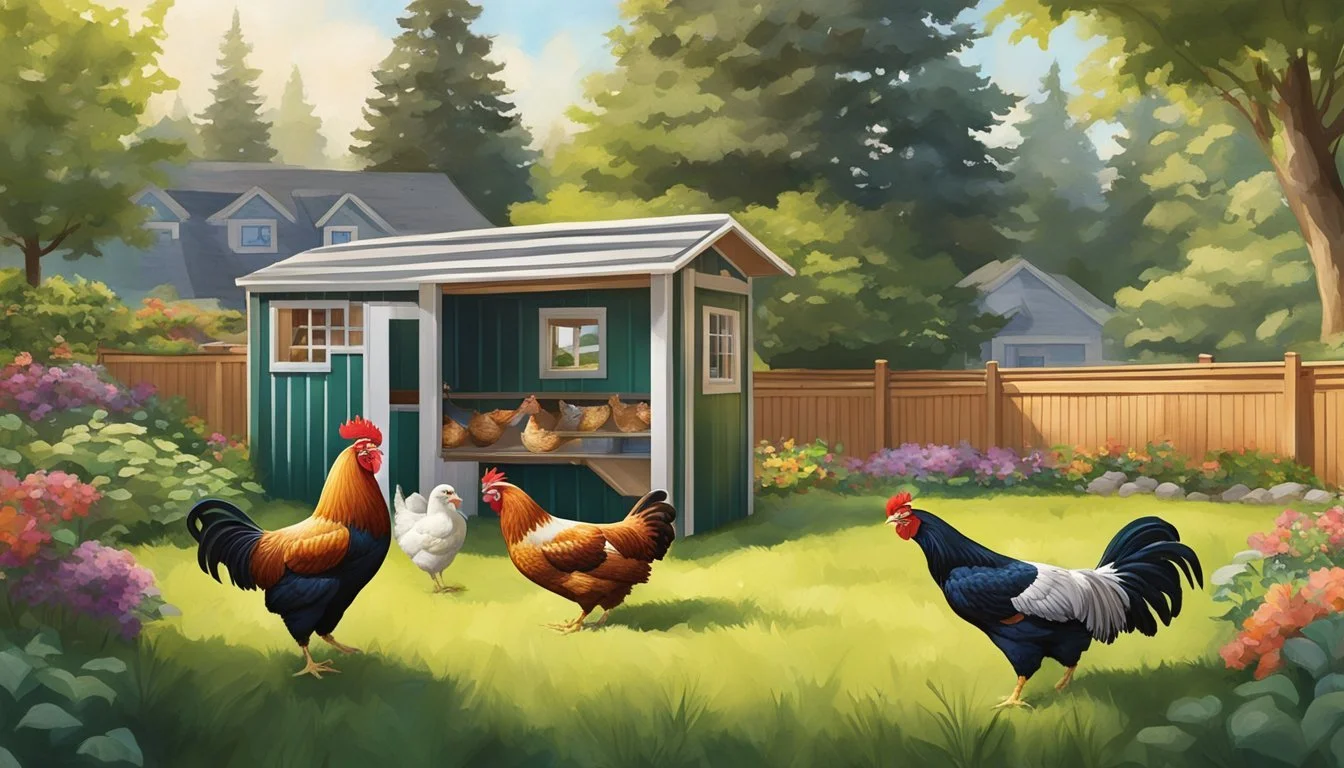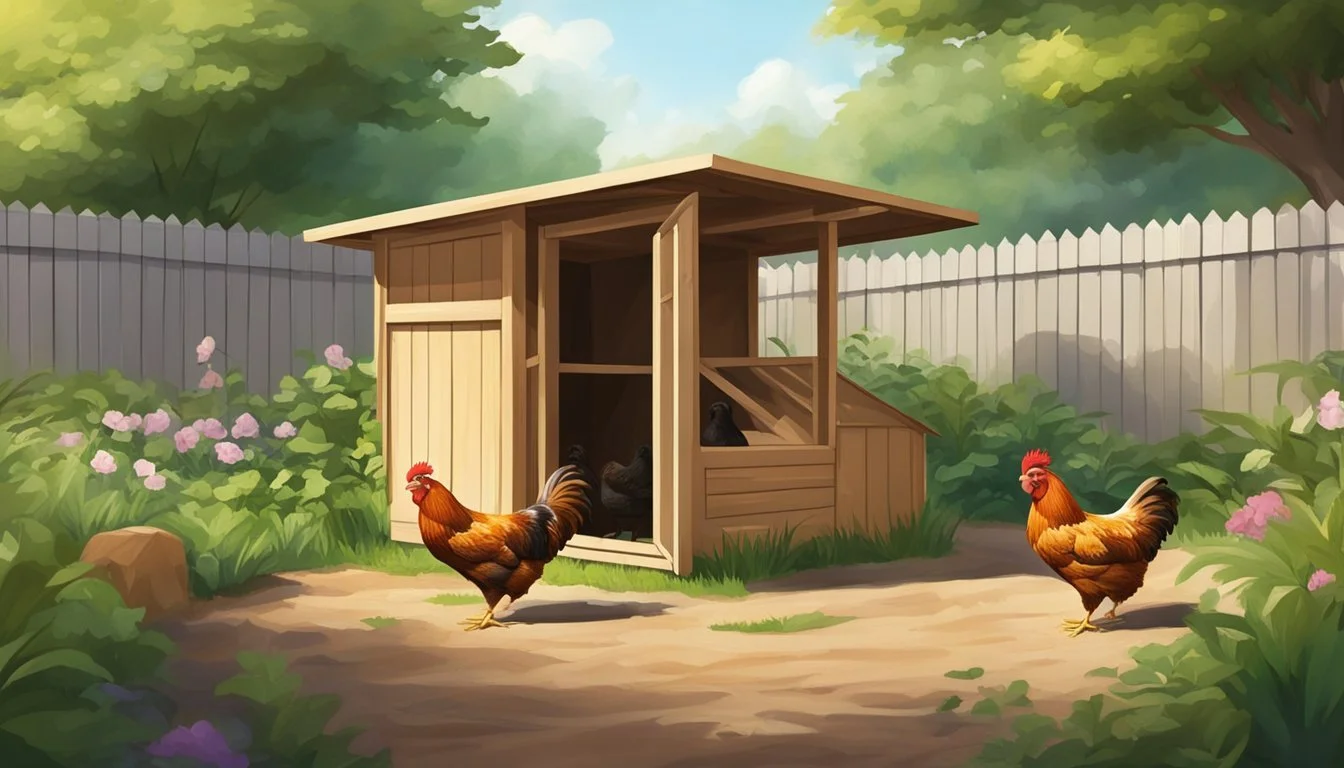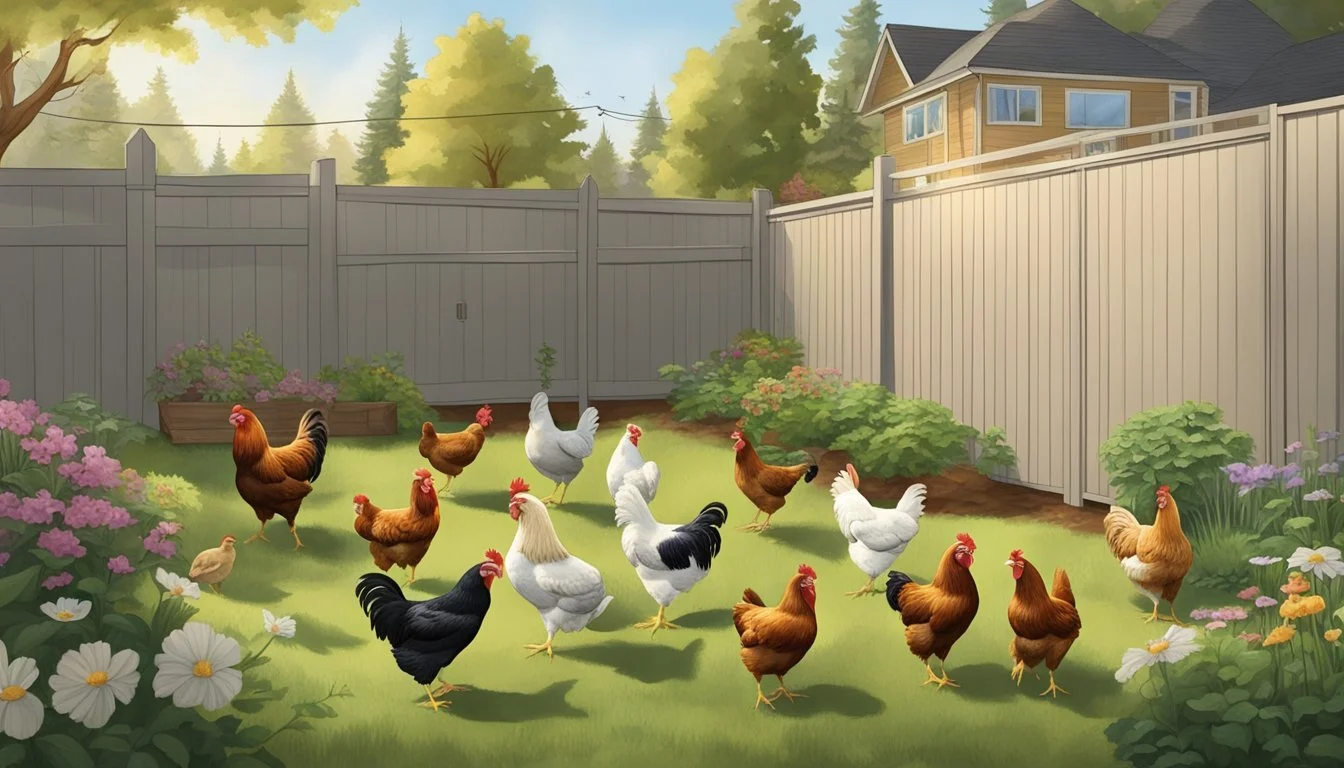Raising Backyard Chickens in Kirkland, WA
Essential Tips for Beginners
Raising backyard chickens has become increasingly popular in the Pacific Northwest, where residents like those in Kirkland, Washington, embrace a blend of urban living and sustainable practices. The trend, not just a quirky hobby but a movement towards self-sufficiency and organic living, involves residents keeping chickens for fresh eggs, natural garden compost, and even as pets. Kirkland residents interested in sustainable living are turning their attention to the advantages and responsibilities of keeping these feathered friends.
Local workshops and community forums offer avenues for both new and experienced chicken owners to share tips, resources, and best practices for successful urban poultry farming. Kirkland, with its vibrant community and emphasis on green living, provides support for residents to navigate the rules and methods of raising chickens responsibly.
Laws in Washington state, including Kirkland, generally allow for the keeping of backyard chickens, but local ordinances must be followed. These regulations can dictate the number of chickens allowed, proximity to neighboring dwellings, and specifics about coop requirements—essential factors for harmony between urban chicken enthusiasts and their neighbors. As the city balances the benefits of urban farming with community standards, Kirkland chicken owners become part of a wider network committed to local agriculture and sustainable backyard ecosystems.
Understanding Local Regulations
Before diving into the nuances of yard fowl regulations in Kirkland, WA, residents must be aware that local laws vary considerably compared to neighboring cities, with strict measures on lot size and number of chickens allowed.
Kirkland's Backyard Chicken Laws
In Kirkland, the local ordinance stipulates strict conditions for keeping chickens. Contrary to what some residents might believe, chickens are only allowed on lots that are 35,000 square feet or larger. This measurement equates to just a bit under an acre, which can be a substantial amount of land for an urban or suburban homeowner. It is essential for residents to understand that allowing chickens to run at large is prohibited and can lead to penalties.
Comparison with Neighboring Cities
When examining neighboring cities, Seattle and Bellevue have more lenient regulations in comparison to Kirkland. Seattle, for instance, allows up to eight domestic fowls on any city lot without regard to square footage. In contrast, Bellevue permits the keeping of up to six fowls. This varies significantly from Kirkland’s requirements, reflecting the importance of understanding local zoning regulations which can change just miles apart.
Navigating Restrictions and Ordinances
Residents in Kirkland and surrounding areas must navigate not only the restrictions on the number of chickens but also other ordinances such as property lines and noise ordinances. Washington State has general guidelines, but it is crucial to consult local zoning authorities to adhere to specific rules. For example, Bothell and Burien may have differing regulations that could influence coop placement and the allowable distance from neighboring homes. In unincorporated Clark County, restrictions might vary further, showcasing the complex patchwork of poultry laws. To comply with these local laws, it is recommended that residents contact Kirkland's City Hall or their respective city government for the most accurate and updated information.
Choosing the Right Chickens
When selecting chickens for a backyard flock in Kirkland, WA, one must consider local climate adaptability, regulations on roosters, and the health indicators of the chickens intended for purchase.
Selecting Breeds for Kirkland's Climate
Choosing the right breeds for Kirkland's climate involves finding chickens that can tolerate the wet and often cool weather of the Pacific Northwest. Plymouth Rocks and Rhode Island Reds are known for their hardiness and ability to lay eggs consistently in cooler climates. Additionally, Australorps and Orpingtons have a reputation for being weather resilient and good layers.
Roosters: To Keep or Not to Keep?
While hens are typically welcome in urban settings for their egg-laying ability, roosters may be subject to stricter regulations due to noise concerns. In Kirkland, it is important to verify local ordinances as they may restrict or prohibit keeping roosters in residential areas. If allowed, consider the proximity of neighbors and the potential noise disruption when deciding whether to include a rooster in your flock.
Recognizing Healthy Chickens
Healthy chickens exhibit clear eyes, clean feathers, and full vigor. It is crucial to check for any signs of lethargy, respiratory issues, or parasites. A chicken should have a well-formed beak, smooth legs, and a red comb to indicate good health. When purchasing chickens, it's advisable to buy from reputable sources to ensure the health of the livestock.
Setting Up Your Coop
When establishing a backyard chicken coop in Kirkland, WA, one must comply with local regulations while focusing on design, predator protection, and hygiene management. These elements are critical to creating a safe and clean environment for your chickens.
Coop Design Considerations
In Kirkland, one's coop should adhere to specific space requirements, with up to three hens allowed on properties under 35,000 square feet. The coop itself requires strategic placement, at least 10 feet from any property line, ensuring adequate room for chickens to engage in natural behaviors such as roosting and dust bathing. Each chicken should have:
Inside the coop: 2-3 square feet per bird.
Outside the coop (run): 8-10 square feet per bird.
The shelter must be robust enough to withstand the local climate, keeping chickens dry and well-ventilated.
Protecting Against Predators
Fowl must not run at large within city limits, and thus, a secure coop is non-negotiable. Coops should incorporate features like:
Locking doors and latches that cannot be easily manipulated by raccoons or other clever predators.
Wired enclosures or fencing for outdoor runs should be buried to deter digging creatures like foxes.
Fine mesh or hardware cloth rather than chicken wire, as it is more difficult for predators to breach.
Regular inspections for signs of wear and breaches in the coop's defense against predators are vital to maintaining security.
Maintaining Hygiene and Managing Waste
To prevent the buildup of bacteria and the spread of diseases, routine cleaning of the coop is necessary. One must:
Change bedding regularly to absorb waste and reduce odor.
Remove droppings and spent bedding, ideally composting it if possible.
Disinfect feeders and waterers to prevent bacteria such as Salmonella.
Proper waste management not only maintains hygiene but also contributes to a healthier environment for both chickens and their keepers.
Daily Care and Management
Raising backyard chickens requires a consistent daily routine that ensures the chickens' well-being, efficient egg production, and a stable social structure within the flock. Proper feeding, understanding social dynamics, and managing egg-laying and broodiness are all critical to success.
Feeding Your Backyard Chickens
Chickens should be fed a balanced diet, typically available as commercial chicken feed, which is formulated to provide the necessary nutrients. Layers pellets are ideal for egg-laying hens, while growers mash suits younger chickens who are not yet laying. It's essential to give chickens access to clean water at all times.
Morning: Provide a measured quantity of feed; this encourages them to consume forage as well.
Evening: Check if additional feed is necessary, based on consumption during the day.
Understanding the Pecking Order
The pecking order is a hierarchical system that chickens naturally establish. Recognizing this order allows owners to identify and address any bullying or stress within the flock. A stable pecking order contributes to the flock's overall health and productivity.
Signs of a disturbed pecking order include frequent squabbling, feather pecking, and evasion behaviors.
Introducing new chickens can disrupt this order; careful monitoring and gradual introduction are recommended.
Handling Eggs and Broodiness
Egg collection should be performed daily to ensure freshness and discourage broodiness, when a hen persistently sits on eggs to hatch them.
If broodiness is unwanted, remove eggs promptly and isolate the broody hen if necessary.
Maintain clean nesting boxes to keep eggs free from contaminants.
In Kirkland, WA, it's important for chicken owners to be aware of local regulations which may affect the management of their flock.
Health and Welfare
The health and welfare of backyard chickens in Kirkland, WA, are paramount for a thriving flock. Owners should focus on preventative healthcare and be vigilant in spotting signs of illness.
Preventative Healthcare Practices
Vaccination becomes crucial when raising chickens, especially for protecting pullets and baby chicks from common diseases. Vaccines are available for illnesses like Marek's disease, which can be administered to baby chicks. Follow the recommended vaccination schedule provided by a local veterinarian or the Washington State Department of Agriculture's Avian Health Program.
Practicing good biosecurity helps prevent the introduction of bacteria and diseases into a flock. Some key biosecurity measures include:
Quarantining new birds for at least 30 days before integrating them with the rest of the flock.
Disinfecting boots and tools that come into contact with the chickens.
Implementing rodent control measures to reduce the risk of disease and bacteria transmission.
The Washington State Department of Health advises against handling sick or dead poultry without protective gear. When contact is unavoidable, individuals should wear an N95 mask and disposable gloves, followed by thorough handwashing with soap and water.
Spotting Signs of Illness
Identifying early signs of illness in chickens can prevent the spread of disease and facilitate prompt medical care. Some common symptoms to be aware of include:
Respiratory distress such as coughing, sneezing, or labored breathing.
Changes in behavior or appearance, like lethargy, huddling, or ruffled feathers.
Gastrointestinal issues manifesting as diarrhea or changes in droppings.
Decreased egg production or abnormal eggs, which could indicate stress or illness.
Should any signs of illness be observed, owners should report sick or dead birds to the WSDA's Avian Health Program and consult with a local veterinarian immediately. Monitoring the health of chickens regularly can lead to prompt treatment and a better chance of recovery.
Community and Legal Considerations
When raising backyard chickens in Kirkland, WA, residents must consider how their activities fit within the community and adhere to specific legal requirements. Maintaining harmonious relations with neighbors and following city ordinances are both crucial.
Being a Good Neighbor
Backyard chicken owners have a responsibility to ensure their hobby does not negatively impact their neighbors. This involves:
Sanitation: Keeping chicken coops clean to prevent odors and pests.
Noise Control: Chickens, particularly roosters, can be noisy; owning hens only can mitigate this.
Property Boundaries: Ensuring chickens do not trespass onto neighboring properties.
Proactive communication with neighbors can preempt complaints and contribute to a positive community environment.
Legal Implications of Raising Livestock
In Kirkland, WA, specific regulations govern the raising of livestock, including chickens:
Lot Size: Distinct codes may require a minimum lot size for chicken-keeping. For example, there are indications that lots must be a minimum of 35,000 square feet.
Running at Large: It is illegal for chickens to run at large within city limits.
Coop Restrictions: Location of the coop in relation to property lines and structures has legal stipulations to follow for reasons such as sanitation and noise control.
Residents must consult the local City Hall and relevant municipal codes to ensure full compliance with Kirkland's ordinances. Adherence to state laws and Kirkland city regulations is non-negotiable for legally raising chickens.
Beyond Chickens
When expanding backyard farms in Kirkland, WA, residents often consider incorporating other types of livestock and find ways to support local ecosystems. An understanding of zoning laws and the ecological impact of various animals is crucial for a successful integration.
Integrating Other Livestock
Horses: They require significantly more space than chickens, generally needing at least an acre per horse for adequate grazing. The Kirkland zoning regulations must be consulted to determine if keeping horses is permissible on the property in question.
Cows: Similar to horses, they demand extensive land, not just for grazing but also for exercise. Prospective cow owners must also consider the need for strong fencing and the potential impact on neighboring properties.
Goats: Known for their versatility, goats require sturdy fencing to prevent escape and may be kept in smaller spaces than cows or horses. They provide benefits such as milk production and brush clearing.
Pigs: They make intelligent and social additions to a farm but require a commitment to proper waste management and containment.
The table below summarizes the general requirements for integrating these animals:
Livestock Space Requirements Key Considerations Horses At least 1 acre per horse Zoning compliance, fencing, stable infrastructure Cows Extensive pasture and roaming area Strong fencing, manure management Goats Small to moderate areas Secure fencing, enrichment, and shelter Pigs Moderate area with sturdy fencing Waste management, proper diet, social needs
Contributing to Local Ecosystems
Bees: They play a pivotal role in local ecosystems through pollination. Keeping beehives can enhance garden productivity and support the health of local plant life. However, one should be mindful of neighbors and local regulations.
In their roles, livestock also contribute to a balanced ecosystem in diverse ways:
Horses and Cows: They help maintain open fields and can aid in seed dispersal.
Goats: Their grazing patterns can control brush and reduce fire hazards.
Pigs: They naturally turn over soil, aiding in land management and fertilization.
Livestock can contribute to the sustainability of local ecosystems when managed responsibly, considering their impact on soil health, plant diversity, and wildlife habitats.








